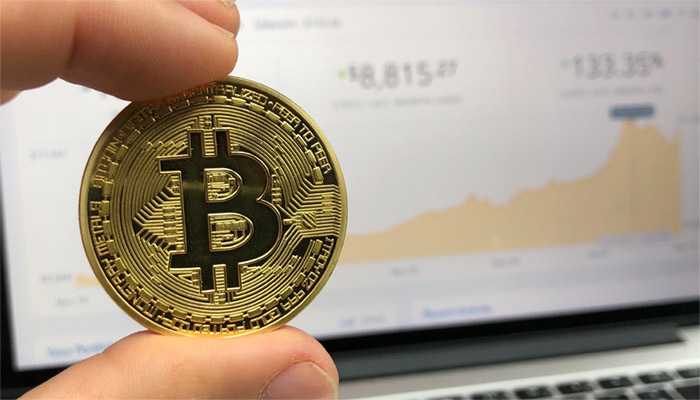Bitcoin, blockchain, cryptocurrency: You may have heard some of these words, maybe even in the context of financial planning and wealth management. But do you know what they really mean – and what they could do for you?
Bitcoin has exploded in recent years, becoming something of a sensation in the realms of investment, finance, and currency. You’ve probably seen countless stories in financial media by now, detailing the risks, rewards, and news surrounding Bitcoin and other types of digital currencies.
Looking to catch up on all the buzz? Here’s a guide to seven common FAQs about Bitcoin for newcomers:
What is Bitcoin?
Bitcoin is the earliest, and one of the most prominent, types of digital currency, also called cryptocurrency.
Its role as an originator is significant, as there are currently more than 1000 digital currencies available, with a total market capitalization of just under $369 billion as of spring 2018, according to a report from Motley Fool. Bitcoin’s market capitalization by itself was north of $139 billion as of March, putting it well ahead of rival currencies such as Ethereum.
Bitcoin began in 2009, when an enigmatic programmer (or, possibly, a collection of programmers), pseudonym Satoshi Nakamoto, introduced a white paper, and then software, to the web, allowing for the creation of this electronic currency.
By design, Bitcoin is a decentralized currency, intended to eliminate “middlemen” from financial transactions. It is a medium of exchange created and held exclusively electronically. With Bitcoin, payments are sent directly from the sender to the recipient using a “peer-to-peer” process, with transactions recorded on an electronic ledger known as the blockchain.
Where Does Bitcoin Come From?
Cash money is printed, and gold is mined. So how are Bitcoin and other cryptocurrencies produced? Where do they come from, so to speak?
Bitcoin is produced through a process called “mining.” To put a complex process in simplest terms, “mining” Bitcoin involves running sophisticated software to solve sets of exceptionally complex mathematical equations. As they are completed, new blocks of Bitcoins are released. There are many different types of individuals and organizations that engage in Bitcoin mining, using increasingly advanced mining hardware.
Though it is virtual, it is important to realize that Bitcoin is still a finite resource. The supply is not unlimited, and there will be a maximum of 21 million Bitcoins created (a ceiling that is projected to be reached around 2140). This limit is intended to prevent factors like inflation or dilution from impacting the currency’s value.
Can You Explain Blockchain?
In hearing about Bitcoin and other cryptocurrencies, you may have heard the phrase “blockchain” come up now and then. Blockchain is the technology that powers Bitcoin and other cryptocurrencies.
In practical terms, blockchain can be thought of as a massive, digitized, and decentralized public record of all cryptocurrency transactions. In other words, the blockchain acts a ledger, recording the details of every crypto transaction and instantly distributing the information to every computer or system on the network. As a result, the process is able to be completely decentralized, cutting out the need for third party agencies to process or store payments. The database of records and transactions is not contained to any one server or physical device, but rather shared among a network of “nodes.”
In many experts’ eyes, blockchain itself will be the biggest and most lasting impact of the advent of Bitcoin and other digital currencies. There are countless ways that blockchain technology could impact the future of not just the financial industry, but healthcare, marketing, and more. It could change the way in which we process and share information in a fundamental way, making it faster, less expensive, and safer from certain risks. This could lead to massive changes in the financial services sector, and could well go on to affect financial markets, and perhaps the global economy more broadly.
What Determines the Price/Value of Cryptocurrency?
With traditional money, “value” – which we might want to think of as “price” or “purchasing power” – is affected by any number of factors. Inflation, exchange rates, and central bank policy all play a part in driving the power of a dollar up or down.
With Bitcoin, price is determined by the rates of supply and demand of the exchange market. As demand for Bitcoin increases, so does the price of a Bitcoin; as demand falls, price falls. Bitcoin is still a relatively small market, meaning that it does not take much to send market prices fluctuating up or down, hence why you will sometimes see it called volatile or unpredictable.
I’ve Heard Bitcoin is Anonymous. Is This True?
One of the reasons that many early adopters were intrigued by Bitcoin was the fact that it was not controlled or centrally owned by any one entitity or organization. At the same time, many regarded the prospect of a decentralized, open source currency as a chance to carry out transactions with complete anonymity.
While there are various, stringent levels of protection available to Bitcoin users, it is not truly anonymous, though it does offer more privacy protections than, say, credit card transactions.
When a person or business uses Bitcoin, they essentially gain access to a digital wallet, which you might also think of as a virtual vault. Though these digital wallets are not necessarily linked to names, addresses, or other personally identifying pieces of information, they are connected to public electronic addresses. Because of the nature of blockchain, extensive public records are created when anyone buys or sells Bitcoins.
How Do I Perform Transactions With Bitcoin?
For most users, using Bitcoin in practice will not look entirely different from using an electronic bank account to make a transfer or purchase, via a computer program or smartphone app.
Bitcoins are stored in a digital wallet. Well, Bitcoins themselves remain part of the blockchain; this wallet acts as a receptacle for the information needed to carry out a crypto transaction, allowing you to access and transfer your personal Bitcoins. There are several different providers and services for virtual wallets.
With Bitcoin, instead of using a third party intermediary to process payments, transactions are essentially direct transfers between payee and recipient. In most cases, transfers are extremely rapid, and may or may not come with fees (beyond a nominal network fee).
Each Bitcoin can be broken up into fractional units, at up to eight decimal places of precision. So, for instance, transactions can be carried out in hundredths of a Bitcoin, thousandths of a Bitcoin, and so on.
For investors looking for alternative investment opportunities, Bitcoin futures are available for trading on the Cboe and CME.
What Are Some of the Pros and Cons of Bitcoin?
As Bitcoin grows ever more popular as a currency, and as an opportunity for speculative investments, it’s important to weigh whether this buzzy cryptocurrency is the right match for you. Bitcoin is unique, and is not without its own singular list of pros and cons. Let’s dig into some common “pluses” and “minuses” that you may be weighing:
Advantages of Bitcoin
- Low fees. Generally, Bitcoin transactions are processed with very few to no fees, though this will depend on factors like network fees, as well as the policies of any exchange or brokerage that you use.
- Transparency. As a direct result of the blockchain, there is an ongoing record of every Bitcoin transaction. This makes charges and exchanges easier to verify, and makes it harder for any one entity, be it an organization or a government, to manipulate the market.
- Competition. Bitcoin markets are competitive, which means that prices can rise and fall quickly, depending on supply and demand. For the right person, this can make Bitcoin trading lucrative and enjoyable.
Drawbacks of Bitcoin
- Risk. As we’ve noted, the price of Bitcoin tends to fluctuate fairly dramatically. It is a highly volatile currency, prone to big swings that you do not really see with other types of currency.
- Not Universally Accepted. While more and more organizations and individuals are seeing some of the advantages of cryptocurrencies, and blockchain more generally, they are far from a standard-bearer for transactions at this point. Bitcoin is not legal tender that a vendor, business, or service must accept.
- Security. Bitcoin poses some of the same security risks as other forms of payment or exchange, but with fewer enforceable standards for protection. Bitcoin exchanges and platforms can be hacked, or fail for other reasons, and individuals using them can be subjected to fraud or theft. Access to Bitcoin wallets can be lost, and there aren’t necessarily the same safeguards in place as there are for, say, credit card users.
Want to Talk Bitcoin?
Even with some of the questions above addressed, you may still have some lingering questions about Bitcoin or other forms of cryptocurrency. Whether your interest in Bitcoin is rooted in the present or looking off to the future, don’t hesitate to bring any of your questions or concerns to us at FourStar Wealth Advisors.
FourStar Wealth Advisors is a Registered Investment Advisor firm headquartered in Chicago. FourStar Wealth is an independent firm, without the conflicts or restrictions of the old school firms. We are directly focused on serving clients in a conflict free environment.
Money and wealth are tools to help investors get where they are going and achieve their hopes and dreams. Our idea is to address the full life cycle of an investor/citizen, and help each of our clients live a full and complete life using our unique Build-Live-Share approach.
Don’t hesitate to give us a call or leave us a message to keep the conversation going.
General Advertising Disclaimer
This article is provided by FourStar Wealth Advisors, LLC (“FourStar” or the “Firm”) for general informational purposes only. This information is not considered to be an offer to buy or sell any securities or other investments. Investing involves the risk of loss and investors should be prepared to bear potential losses. Investments should only be made after thorough review with your investment advisor, considering all factors including personal goals, needs and risk tolerance. FourStar is a SEC registered investment adviser that maintains a principal place of business in the State of Illinois. The Firm may only transact business in those states in which it is notice filed or qualifies for a corresponding exemption from such requirements. For information about FourStar’s registration status and business operations, please consult the Firm’s Form ADV disclosure documents, the most recent versions of which are available on the SEC’s Investment Adviser Public Disclosure website at www.adviserinfo.sec.gov/






